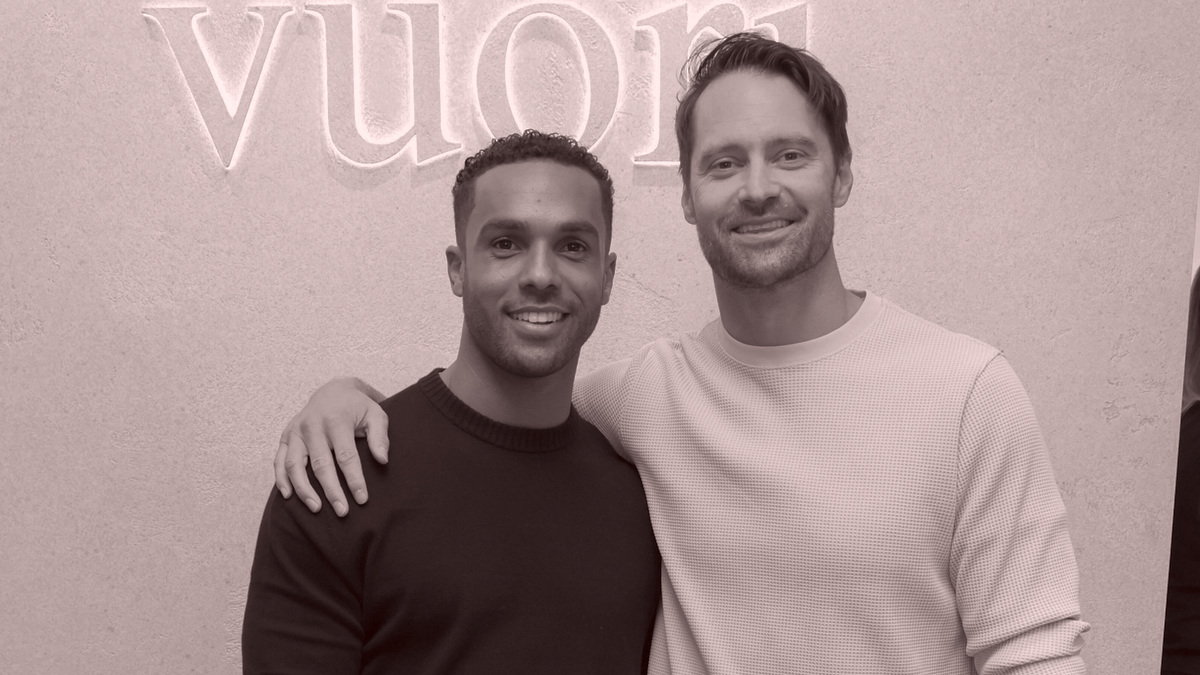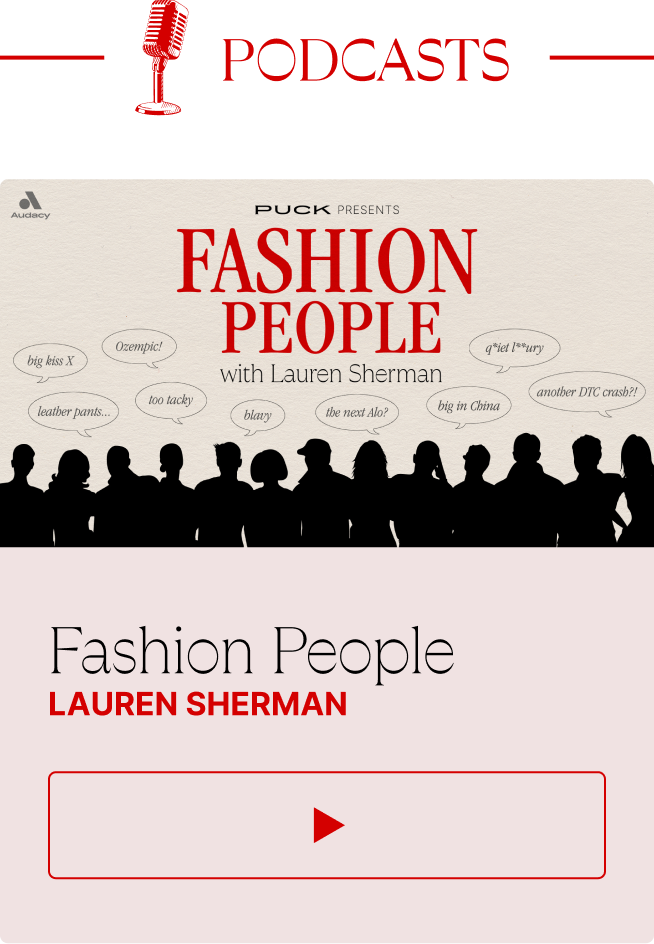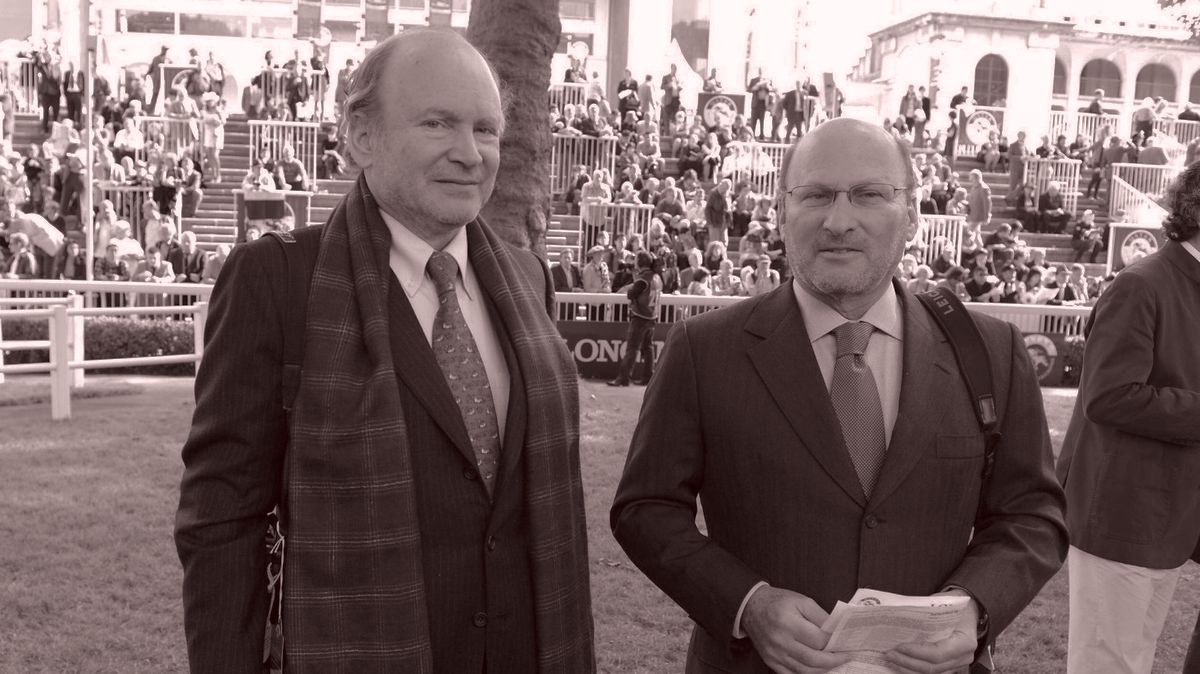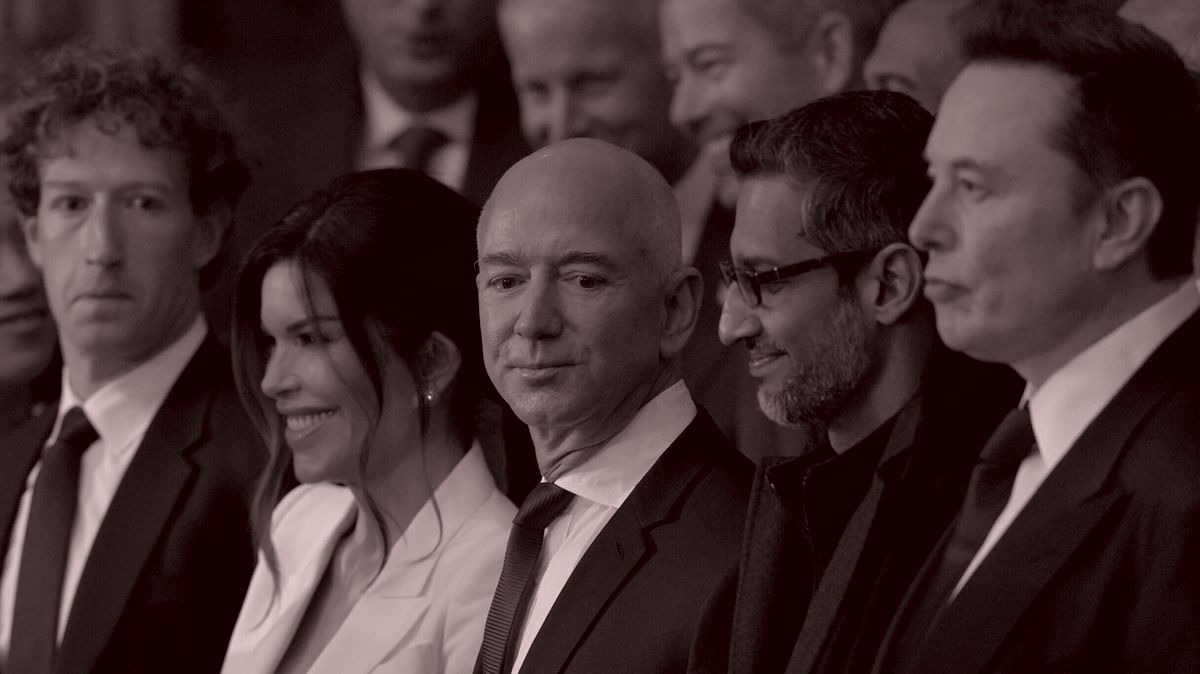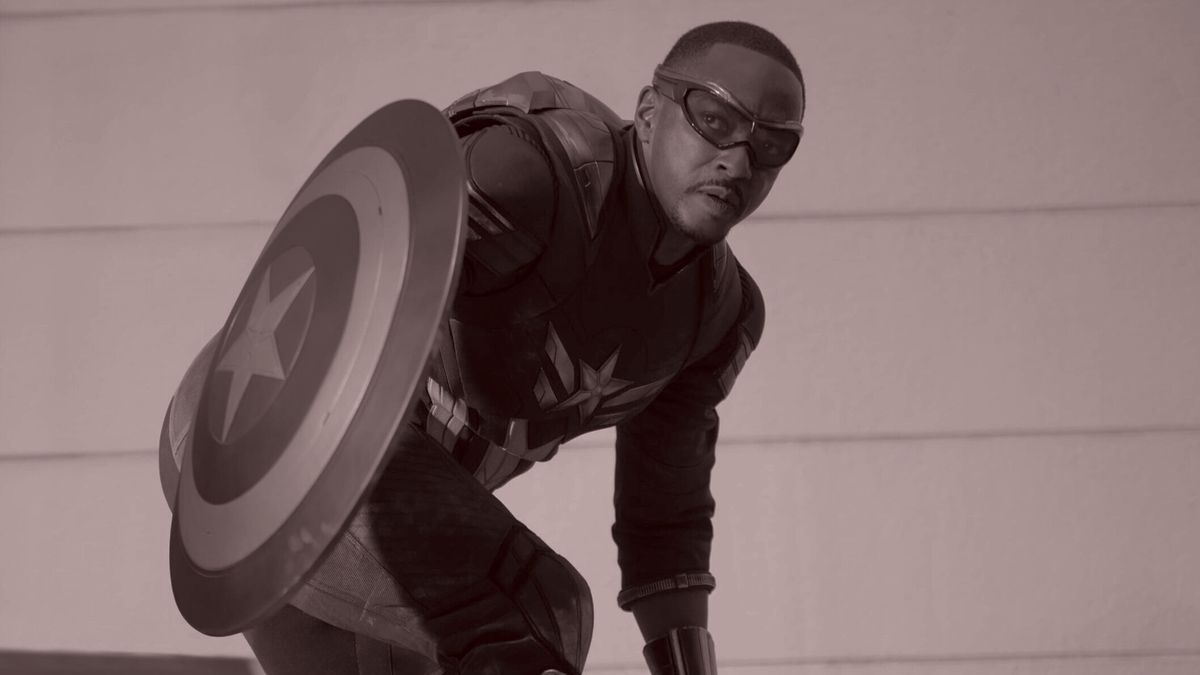Hi, and welcome back to Line Sheet. What a wild 24
hours. We’re already on tariff watch, and I still have very little to say about Lauren Sánchez’s bra top, other than… bad taste is better than no taste, right?
Speaking of no taste, how is that secret Vuori wardrobe treating
you? Sarah “SShapiro@puck.news” Shapiro is back to get to the bottom of a modern retail mystery: With a $5.5 billion valuation and well over a billion dollars in investment from the likes of Stripes, General Atlantic, and SoftBank, how big can Vuori actually get? (Also, don’t feel bad if you like Vuori. I hear those joggers are very soft.)
In other news, I have a Savage x Fenty scoop, and some deets on Oscar de la Renta’s red-state push. Meanwhile, on the back of Melania’s polarizing Hamburglar hat by Eric Javits—yes, his uncle was a U.S. senator for New York and the namesake for the far west side convention
center—Sarah explains how millinery remains a viable business for retailers. (I promise that Puck’s very own hat aficionado, Alex Bigler, is not floating the entire industry.) And yes, I, too, am devastated to learn that our beloved Simone Bellotti is leaving Bally. But, according to what I’m hearing (and what WWD is
also reporting), he may be moving on to greener, Renzo Rosso-funded pastures. More on this soon.
🛍️🛍️ Sarah has something for those of you with The Shoppies: With intense cold gripping much of the U.S. and snow falling across the South (!), those of us who forgot to buy the proper Heattech
at the beginning of the season may be scrambling. I like this cashmere turtleneck from Soldout.nyc, a scrunchier, slightly more elegant version of the essential Uniqlo base layer. Also: bonnets and
balaclavas have been normalized, at least in major metropolitan areas. The Row’s version with an attached dickie would make my grandmother proud.
Mentioned in this issue: Joe Kudla, Vuori, Livvy
Dunne, Lululemon, Masayoshi Son, Allbirds, Varley, Adam Selman, Rihanna, Hillary Super, Alex Bolen, Victoria’s Secret, Daniel Roseberry, Donald Trump, Tiffany, Eric Javits, Melania, Oscar de la Renta, J.D. and Usha Vance, Ivanka Trump, Hoka, Jill Biden, Ralph
Lauren, Bloomingdale’s, the Kentucky Derby, and much more…
|
Three Things You Should Know…
|
- Adam Selman ducks out of Savage x Fenty: I hear that the admired designer is leaving his position at the lingerie brand, which launched in 2018 as a joint venture between Rihanna and the TechStyle Fashion Group. Selman has a long history of working with Rihanna (he did the “naked dress” that she wore to the CFDAs in 2014), and I’m guessing that he’ll do so again in some capacity. As for why he split from Savage x
Fenty: Unclear, but the business was dealt a blow when C.E.O. Hillary Super left for incumbent Victoria’s Secret just a year into her tenure.
While Savage x Fenty has certainly changed the conversation around underwear, there have been challenges along the way, in part because of an ill-conceived subscription model
heralded by TechStyle but then walked back as the realities of maintaining subscriptions became a customer service nightmare. (“Membership” is still an option, but now you can buy one-offs.) Selman, who ran his own line for years, is always in the conversation for jobs in Europe, where his partner, Daniel Roseberry, designs Schiaparelli. So maybe he’s off to Paris? A rep for Savage x Fenty did not immediately respond to a request for comment.
- Oscar de la Renta’s big red bet: On Monday morning, a frustrated editor friend asked me for my thoughts on why fashion brands were participating in the still-manifesting Trump presidency. The simple answer was that it all feels so much more complete this time. Trump ran up a large margin in the Electoral College and decisively won the popular vote. There was no election needle surprise, nor any sleight-of-hand tricks about his
intentions. He’s telegraphed his moves on pardons, tariffs, and deportations for months. Half the country asked for this.
Much of the fashion-related inauguration coverage has been about who played ball with the Trumps and Vances, and who refrained. And, not surprisingly, most have engaged—either because they are prioritizing their business, relenting to the vox populi, or they’ve just given up. (Puck’s Peter Hamby recently argued that the
president only has about 18 months to push his unfiltered agenda before the realities of Washington, and the Constitution, set in. It’s a great read…)
But the most visible label during inauguration weekend was certainly Oscar de la Renta, worn by Usha Vance on multiple occasions, as well as Ivanka
Trump. (Interestingly, Jill Biden’s inauguration look was designed by Ralph Lauren, who bit the bullet in 2016 and dressed Melania in a gorgeous Tiffany-blue wool dress, but seems to be staying away from the Trumps and Vances for now.) The flood of imagery has certainly garnered plenty of attention online, both good and bad, for de la Renta. (The approach is in line with their greater strategy: Over the past few
years, the company has mostly invested its marketing dollars in custom dresses for the red carpet instead of echo-chamber runway shows.)
Was it worth it? I suspect that social media tracking firms will start spitting out data on Inauguration Day brand chatter very soon, but here’s what we know now. While the brand’s Instagram account initially lost about 15,000 followers, they’ve already regained about 10,000, and more importantly… they’ve sold dresses and coats. For instance,
four people have already put down deposits for Ivanka Trump’s pearl-beaded gown, which she wore to parties on Sunday. (I don’t think the company has determined the final retail price, but let’s just say that dresses of that ilk can be as much as $15,000—often a whole lot more.)
I rang up Oscar de la Renta C.E.O. Alex Bolen earlier today to ask him how he felt about the whole thing, including losing online followers. Bolen told me that his main
goal is to dress (and be associated with) public-facing women who are accomplished. Bolen reminded me that Dr. Jill Biden also wore the brand often, and that her appearances in ODLR moved plenty of merch as well. As for the follower loss, he was unconcerned, especially given that the weekend did what he wanted it to do: sold clothing, and put Oscar de la Renta at the center of the conversation.
|
|
|

|
Sarah Shapiro
|
|
- The
staying power of the milliners: Melania Trump’s decision to wear an Eric Javits boater at the inauguration highlighted an often-overlooked corner of fashion retail that’s managed to survive despite dramatic industry changes. The hat business remains intensely seasonal and trend-driven—one winter might see only cashmere beanies moving, while a single celebrity in an oversized cowboy hat can suddenly revive structured silhouettes for another 15 minutes.
Having worked the hat market as
a Bloomingdale’s accessories buyer, I can attest to its distinctly old-world character. The Eric Javits showroom experience was particularly memorable: My team and I would exit the elevator into a literal cage, buzzing for admission while praying someone was actually there to let us in. The showroom had a dated, almost 1950s atmosphere that perfectly captured the traditional nature of the business. After all, Eric Javits, the nephew of former New York Republican senator
Jacob, has long been the summer go-to for the country club set with his trademarked Squishee straw hats.
While recent influences like FX’s Feud: Capote vs. The Swans have reignited interest in ladylike hats, and artisanal makers like Gigi Burris are attracting a new luxury customer, the fundamentals haven’t changed much. Department stores still need to maintain
small but strategic hat assortments or risk losing the traditional customer entirely. The calendar remains predictable: Easter and the Kentucky Derby drive dress hat sales, while straw hats and visors continue to dominate summer business. I don’t expect Melania’s boater to change that or to inspire throngs to rush out in search of that look.
|
|
|
And now, here’s Sarah on the Vuori-fication of America, and how far it may
go…
|
|
|
If LinkedIn had a clothing line, it might look a lot like Vuori:
bland, technical, sufficiently breathable for crushing those quarterly all-hands from your remote location. But with a big bet from SoftBank (and others) and a $5.5 billion valuation, can the San Diego brand sell enough comfortable, forgettable clothing to keep its investors happy?
|
|
|
This past Saturday, I engaged in a thought experiment. After
reading the Times’s soft-focus magnum opus on Vuori and the modern state of athleisure, the artfully titled “How Vuori Became One of the Hottest Names in Fashion,” I decided to count the number of men (and women) in its technical fabrics during my son’s basketball game. And despite the fact that we live in the Bay Area, where consumers can indulge a vast array of their sartorial desires, I simply stopped counting after a while:
Vuori gear had become inescapable. Nearly every other parent on the sidelines was wearing their hoodies, outerwear, or ubiquitous joggers. Their tech pants, which dominate the post-pandemic office casual scene alongside Lululemon’s ABC trouser, were also well represented.
Perhaps I shouldn’t have been surprised. The 10-year-old San Diego brand leaned into an upscale comfortable semi-aesthetic that metastasized during the pandemic—an era that took on a millennial-fabricated work-life balance fantasy wherein office workers could relocate to far-flung locales and log into Zooms between beach runs and long hikes. (Sorry, kids, it doesn’t work that way in the real world.) Most brands in the space
enter the market at the performance tier, the top of the pyramid—Hoka and On were discovered by hardcore runners before they became fashion shoes; ditto Lululemon and Alo in the yoga space. Vuori, on the other hand, entered the zeitgeist via former lax bros who worked at hedge funds and practice mediation for career advancement.
Nevertheless, or perhaps because of this market capture, the business began an
impressive ascent. As a pure-play direct-to-consumer business when that channel seemed indomitable, Vuori attracted significant investor interest and made shrewd strategic investments in launching a women’s line, leaning into wholesale, and building a brick-and-mortar retail business. In 2021, SoftBank made a Series B investment at a valuation of $4 billion. This past November, the company raised a Series C at $5.5 billion, with investments from General Atlantic and Stripes.
These days, it’s hard to find a premium North American shopping destination without a Vuori or one coming soon. The brand claims to have a 50-50 sales split between the men’s and women’s category, which is rare. (Lululemon famously had a difficult time establishing itself in the men’s category because its logo appeared too feminine. They had to work a testicular reference into the name of their ABC tech pants to make the yoga
brand safe for insecure dudes.) In the Times story, founder and C.E.O. Joe Kudla proudly touted the frugality he absorbed in his past life as a C.P.A., boasting that Vuori has never acquired customers at a loss. Perhaps it’s a Vuori world and we’re just living in it…
|
No, It’s Actually Not a Vuori World…
|
Of course, I’ve got some concerns about Vuori. For starters,
Kudla’s customer-acquisition cost line seems like some creative accounting to me. Every brand operates with negative CACs—it almost always costs more to acquire a consumer than they spend on their first, and sometimes only, purchase. Successful brands live with this math because many consumers make repeat purchases, and the lifetime value of a loyal shopper inevitably outweighs the initial loss in marketing to them.
I’m also curious about the SoftBank money. Yes, its founder, Masayoshi Son, is one of the greatest investors of our time, as his foundational capital into Alibaba attests. But he isn’t infallible: WeWork, whose charismatic founder took $16 billion from SoftBank, proved to be a fundamentally smaller business than its investors had anticipated. But Son isn’t forking over that kind of capital to an apparel brand without controls and ambitions
to make Vuori into an enormous, quasi-Lululemon-sized business—which it may or may not deserve to be. When I worked at Brandless, a C.P.G. startup doing D.T.C. groceries pre-pandemic, SoftBank led our Series C with a staggering $240 million investment. It was exciting, but the pressure to show a path to exponential growth was intense, and Brandless ultimately gave up and sold the assets to a private investment firm and marketing agency 20 months later.
And then there are the clothes, themselves. Fashion-wise, Vuori is playing it incredibly safe, albeit with some execution misses. The brand originally found success with mid-tier basics in slightly technical fabrics—comfortable, breathable clothing for people who don’t know how to dress, and in more limited quantities for people who do. (Everyone needs lounge pants these days.) Their performance jogger was a bestseller when it first came
out—I have a pair and liked it enough to buy a second—but I haven’t seen other items that are sufficiently compelling to drive a purchase.
Vuori obviously seems better positioned than Allbirds, a former D.T.C. wunderkind that was beloved by V.C.s but got stuck as a one-hit wonder brand after it couldn’t build on the success of its wool sneakers. But the product seems insufficient for a $5.5 billion valuation,
especially when Rhone and Lululemon and many others do roughly the same thing in these stretchy, soft technical fabrics. The colors are generally muted so as to offend or delight no one, but this strategy is often at odds with the general trends in the fashion industry. After leaning into the W.F.H. lifestyle by amassing drawers stocked with sweats and athleisure during the pandemic, many are set in this category, and not looking for more items unless they offer something different and
compelling.
|
For years, Vuori’s advantage was its D.T.C. channels—the company
had complete control over the customer experience and owned all the data, end to end. And yet, these channels alone aren’t enough to live up to its Series D dreams. So far, its most critical partnership has been with Nordstrom, which conferred fashion credibility and proved it appealed as an active brand to the premium retail consumer. Vuori also has a robust distribution strategy through local boutiques, like stores for performance runners or the athleisure option in fashion boutiques, but I
expect they will end these relationships to focus on their owned-and-operated brick-and-mortar channels.
What will this channel look like? Every activewear brand seems to be building stores that double as workout studios, and Vuori is following the same blueprint. The company is partnering with instructors for classes at Vuori stores and trainer-led runs commencing at their stores, and with
running-shoe brands, like On and Hoka, to make up for their shoeless product line. Will this get customers in the door and drive them to purchase yet another pair of technical joggers or yoga tights? In the end, at that valuation, Vuori will need everyone, including the fashion-forward customers it has yet to prove it can attract. (I’m watching Alo and Varley in this space.) After all, there will always be another brand around the corner, and Vuori needs to make the most of the hundred
or so stores they’re opening, and justify them as a vehicle for growth.
Meanwhile, Vuori quickly signed Livvy Dunne, the LSU gymnast, influencer, and SI swimsuit model who is dating star MLB pitcher Paul Skenes, as the brand’s first collaborator. (It has since signed hundreds more college athletes as part of name-image-likeness deals.) Indeed, in a
multichannel world—and with SoftBank’s money—the company needs to have it both ways: to influence younger customers whose loyalty to Vuori’s soft fabrics could be a durable asset while recognizing that the athleisure wave will only carry them so far. Sustaining that growth will take more than just tech pants, joggers, and flimsy t-shirts.
|
What We’re Reading… and Listening To…
|
Jenna Lyons makes an excellent case for custom
clothing on the final Season 1 episode of Harper’s Bazaar’s The Good Buy. Investing in tailoring is almost always worth it, and so is listening to this podcast. [The Good Buy]
Setting aside the
saga of Jack McCollough and Lazaro Hernandez going to Loewe, the Proenza Schouler PS1 schoolboy bag is due for a revival. Liana Satenstein’s latest retrospective is a look back at the PS1
bag and the hold it had in the street style era. Unsurprisingly, she inspired Sarah to hunt for one herself. This suede fringe version is in gorgeous condition and costs less than most mid-priced bags. [Neverworns]
The LVMH-produced Olympic medals from Paris 2024 are allegedly deteriorating because they were missing a varnish recently banned in France. (The country’s laws against potentially harmful chemicals are often very strict.) Look, the U.S. just banned Red Dye No. 3 (apparently very bad), so our guess is that this won’t
happen at the Los Angeles games in 2028, no matter who makes the medals. [New York Times]
Nepenthes isn’t closing, everyone. BBSP “walked it back with a follow-up,” as one of our dedicated readers alerted Lauren. A piece of advice: At least ask the subject of
your post for comment! [X]
Word from Milan is that Men’s Fashion Week felt pretty dead. There was Prada, there was John Turturro, there was Zegna. Wait, is Dunhill good now? (Mixed reviews.) Armani was the Armani we all want it to be. Anyway, the real ones (mostly Sam Hine and Jacob
Gallagher) continue documenting the best of the men’s shows so far. Most importantly, Jacob called Prada the “sexiest men’s runway show in recent history.” [GQ and L’Etiquette
and New York Times]
Turns out, the one and only Rod Manley, late of Burberry—and, before that, Calvin and Armani—landed at Moncler. (His title is chief brand officer.)
[WWD]
|
That’s it for today. P.S., remember when people believed that
Jeremy Scott was really, truly, maybe going to be the next creative director of Chanel? What a year we’ve lived!
Until tomorrow,
Lauren
|
|
|
Puck fashion correspondent Lauren Sherman and a rotating cast of industry insiders take you deep behind the scenes
of this multitrillion-dollar biz, from creative director switcheroos to M&A drama, D.T.C. downfalls, and magazine mishaps. Fashion People is an extension of Line Sheet, Lauren’s private email for Puck, where she tracks what’s happening beyond the press releases in fashion, beauty, and media. New episodes publish every Tuesday and Friday.
|
|
|
Puck’s daily art market email, anchored by industry expert Marion Maneker, offers unparalleled access to the
mega-auctions and galleries, elite buyers and sellers, and the power players who run this opaque world. Wall Power also features Julie Brener Davich, a veteran of Christie’s and Sotheby’s, who provides unique insights into how the business really works.
|
|
|
Need help? Review our FAQ page or contact us for assistance. For brand partnerships, email ads@puck.news.
You received this email because you signed up to receive emails from Puck, or as part of your Puck account associated with . To stop receiving this newsletter and/or manage all your email preferences, click
here.
|
Puck is published by Heat Media LLC. 107 Greenwich St, New York, NY 10006
|
|
|
|

